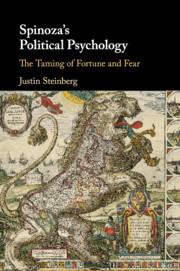Book contents
- Spinoza's Political Psychology
- Spinoza's Political Psychology
- Copyright page
- Dedication
- Contents
- Figures and Tables
- Acknowledgments
- Note on Primary Sources and Abbreviations
- Introduction
- 1 Metaphysical Psychology and Ingenia Formation
- 2 Eliminating Juridical Constraints and Naturalizing Right
- 3 The Continuity Thesis and the Aim of Government
- 4 The Politics of Hope and Fear
- 5 Statecraft and the Taming of Fortune
- 6 From Superstition and Persecution to True Religion and Toleration
- 7 The Affective and Epistemic Cases for Democracy
- 8 Salvation, Eternity, and the State
- References
- Index
- References
References
Published online by Cambridge University Press: 31 October 2018
- Spinoza's Political Psychology
- Spinoza's Political Psychology
- Copyright page
- Dedication
- Contents
- Figures and Tables
- Acknowledgments
- Note on Primary Sources and Abbreviations
- Introduction
- 1 Metaphysical Psychology and Ingenia Formation
- 2 Eliminating Juridical Constraints and Naturalizing Right
- 3 The Continuity Thesis and the Aim of Government
- 4 The Politics of Hope and Fear
- 5 Statecraft and the Taming of Fortune
- 6 From Superstition and Persecution to True Religion and Toleration
- 7 The Affective and Epistemic Cases for Democracy
- 8 Salvation, Eternity, and the State
- References
- Index
- References
- Type
- Chapter
- Information
- Spinoza's Political PsychologyThe Taming of Fortune and Fear, pp. 217 - 230Publisher: Cambridge University PressPrint publication year: 2018



